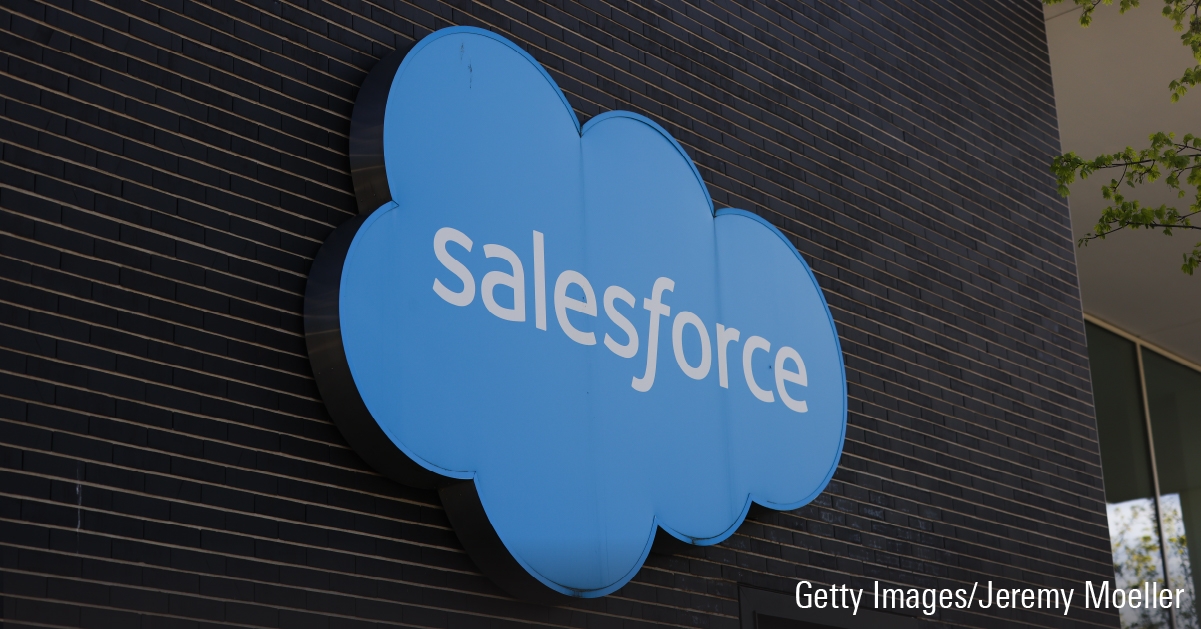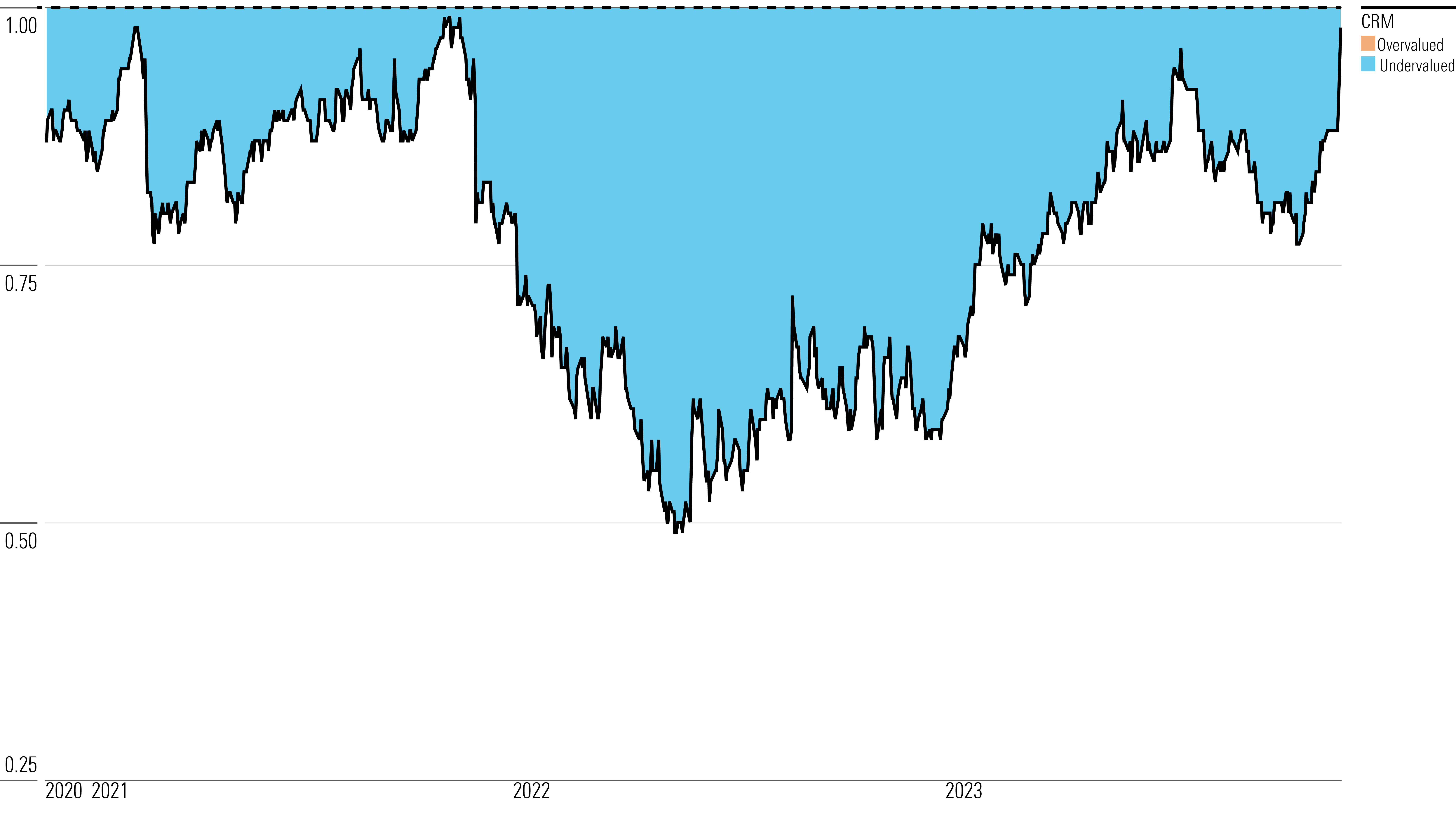After Earnings, Is Salesforce Stock a Buy, a Sell, or Fairly Valued?
With revenue up 11%, here’s what we think of Salesforce stock.

Salesforce CRM released its third-quarter earnings report on Nov. 29. Here’s Morningstar’s take on Salesforce’s earnings and stock.
Key Morningstar Metrics for Salesforce
- Fair Value Estimate: $265.00
- Morningstar Rating: 3 stars
- Morningstar Economic Moat Rating: Wide
- Morningstar Uncertainty Rating: High
What We Thought of Salesforce’s Q3 Earnings
- Salesforce continues to perform well in a measured environment, with upside versus our aggressive expectations for both revenue and profitability for its fiscal third quarter. Guidance was also good, particularly for profitability. Management was enthusiastic to discuss green shoots in the data cloud segment, while we were impressed by the performance in large deals and the acceleration in growth in remaining performance obligation, or RPO. We also applaud the firm’s continued focus on capital returns, with $1.9 billion in share buybacks this quarter. Based on quarterly upside and updated guidance, we made minor adjustments to our model and raised our fair value estimate to $265 per share from $255. With shares jumping in the aftermarket, the stock seems slightly undervalued, in our view.
- Third-quarter revenue grew 11% year over year (10% in constant currency) to $8.72 billion, versus the high end of guidance of $8.72 billion. Like in the last several quarters, strength was driven by MuleSoft and the data cloud, as well as solid execution. Current RPO grew 13% year over year in constant currency, representing an acceleration beyond revenue growth after lagging since the beginning of fiscal 2023, which management indicated was mainly due to a very large customer contract. Professional services remain subdued and the overall demand environment remains measured. Multi-cloud deals were strong, with nine of the top 10 deals involving six or more clouds and an impressive 80% growth in deals worth $1 million or more. Offsetting these revenue drivers was a softness in transactional type revenue and Slack self-service.
- We continue to see a path for margins to expand even as the firm invests in near-term innovation in artificial intelligence. Profitability remains impressive, as Salesforce produced a non-GAAP operating margin of 31.2% versus 22.7% a year ago. Major restructuring actions from January 2023 continue to help boost margins, but the internal cultural shift is evident.
Salesforce Stock Price
Fair Value Estimate for Salesforce
With its 3-star rating, we believe Salesforce’s stock is fairly valued compared with our long-term fair value estimate.
Our fair value estimate for Salesforce is $265 per share, which implies a fiscal 2024 enterprise value/sales multiple of 7 times, an adjusted P/E multiple of 32 times, and a 3% free cash flow yield.
We model a five-year compound annual growth rate for total revenue of 12% through fiscal 2028, which we think will be driven by strength in platform and marketing clouds, along with AI innovation. Our revenue forecast assumes modest acceleration after depressed growth in both fiscal 2023 and 2024. We forecast non-GAAP operating margin expanding from 23% in fiscal 2023 (actual) to the low 30% range in fiscal 2028, which we think is consistent with management’s new profitability focus.
We believe the underlying markets are large and growing. According to management, the total addressable market will grow to $248 billion by 2025, with CAGR for the markets served by Salesforce’s various clouds generally ranging from 12% to 20%. In our view, the company will benefit from natural cross-selling of solutions among the clouds. To help support a decade of strong growth, we model $500 million of bolt-on acquisitions annually after a strategic shift from inorganic growth.
Read more about Salesforce’s fair value estimate.
Salesforce Historical Price/Fair Value Ratio

Economic Moat Rating
We assign Salesforce a wide moat overall, arising primarily from switching costs with support from a network effect.
Salesforce has grown to achieve a 33% market share over the last 20 years. Customers and industry observers alike view Salesforce as the clear frontrunner in a category that increases the productivity of sales representatives. This is mission-critical software that helps drive revenue for users. We believe this segment enjoys a wide moat—indeed, the widest moat among Salesforce’s four cloud solutions. A variety of industry data points indicate Sales Cloud SFA is a best-of-breed solution, which creates a certain amount of organizational inertia, as IT managers and executives engage in self-serving behavior.
MuleSoft slides into this segment naturally, as it helps customers solve a major pain point: integrating data and applications across platforms. We believe this segment enjoys a wide moat, supported by high switching costs and a network effect. Application development platforms are sticky, since they serve as the cores around which businesses and processes are built, and switching could be highly disruptive and expensive for developers. Salesforce was early to the market with a cloud-based application development platform for customers. Using the platform provided the low-investment benefits of a SaaS product, allowed for immediate and smooth integration with Salesforce’s solutions, and let developers sell (or give away) the applications they developed on the company’s AppExchange.
In our opinion, the strength of these clouds is important but should not overshadow the solutions Salesforce offers under one umbrella. We believe customers value the firm’s discrete clouds as stand-alone solutions, but the various clouds are highly complementary and tightly integrated, making the complete set more compelling. Customers are also looking to consolidate vendors. These factors combine to reinforce a wide moat. As the company offers a wider set of related and best-in-class solutions, we believe it becomes more deeply entrenched in its customers as they adopt multiple clouds.
Read more about Salesforce’s moat rating.
Risk and Uncertainty
We assign Salesforce a Morningstar Uncertainty Rating of High. We believe Marc Benioff will be difficult to replace as CEO. He pioneered the software industry, co-founded the company, and led it to be a dominant force with a broad portfolio of sales and marketing solutions.
We believe the most important metric for Salesforce investors is revenue growth. Continued deceleration in the Sales Cloud, or growth that does not materialize as expected in the Service, Marketing, and Commerce Clouds, would therefore likely harm the stock.
To help drive growth, Salesforce has also been acquisitive, though we do not believe these acquisitions have been transformative. Investors have been concerned at times about rich valuations and organic growth prospects, as was the case with the Slack, Tableau, and Mulesoft acquisitions over the last several years. We believe the company is likely to continue to make acquisitions and occasionally pursue a larger deal. In these situations, valuation and integration will remain risks. Salesforce is also likely to face new competitors as it continues to acquire its way into markets it was not previously serving, as seen with the Demandware acquisition.
Read more about Salesforce’s risk and uncertainty.
CRM Bulls Say
- Salesforce dominates the SFA space, but still only controls 30% of a highly fragmented market that continues to grow by double digits each year, suggesting there is still room to run.
- The company has added legs to its overall growth story, including customer service, marketing automation, e-commerce, analytics, and artificial intelligence.
- Management is likely going to focus on expanding margins after years of subscale profitability.
CRM Bears Say
- As the company gets larger, it may be increasingly difficult for it to grow faster than its various end markets.
- Salesforce has entered new areas via acquisition and has arguably paid material premiums in the process. Integration risk is real, as is the risk of increasingly large, dilutive, or ill-conceived deals.
- Despite its size, Salesforce has generated substandard margins in recent years, and its renewed focus on profitability may negatively affect already-slowing growth.
This article was compiled by Brendan Donahue.
The author or authors do not own shares in any securities mentioned in this article. Find out about Morningstar’s editorial policies.


/cloudfront-us-east-1.images.arcpublishing.com/morningstar/347BSP2KJNBCLKVD7DGXSFLDLU.jpg)
/cloudfront-us-east-1.images.arcpublishing.com/morningstar/TP6GAISC4JE65KVOI3YEE34HGU.jpg)
/d10o6nnig0wrdw.cloudfront.net/04-29-2024/t_d0e8253d77de4af9ae68caf7e502e1bf_name_file_960x540_1600_v4_.jpg)